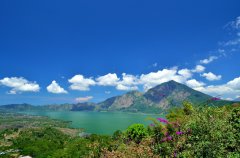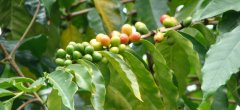Organic cultivation of coffee treasures from the hometown of giant turtles
Coffee from the home of the giant turtle. This coffee is of excellent quality and grown without any chemicals.
Coffee is grown in Saint Crstóbal. San Cristobal is one of the larger islands in the Galapagos Islands and the only island in the archipelago with sufficient fresh water. At an altitude of 410 metres, there is a small lake called El Junco, which forms streams along the rocks and volcanic rocks on the southern slope of the island. Fresh water rich in minerals nourishes the soil of San Cristobal, keeping it permanently moist and fertile.
In 1875, Ecuador's indigenous Mauel J. Cobos planted about 100 hectares of arabic bourbon coffee trees in the Hacienda El Cafetal in San Cristobal. The altitude of the plantation is between 140 and 275 meters, and the climate of the region is equivalent to that of 910-1830 meters inland. This gradient is very suitable for the growth of very hard coffee beans (SHB) with high acidity and is also the key to the quality of coffee.
As the world's coffee industry moves toward a mass-production model, San Cristobal's smaller and less reliable coffee industry is in trouble and may eventually be forced to give up without profit.
In the early 1990s, however, the Gonzalez family bought Hassenda Coffee Plantation. Local microclimates caused by the Humboldt Current, intense equatorial sunlight and sharp temperature variations (43 ° C at sea level and 10 - 16 ° C at 275 m above sea level) provided the unique favourable conditions that prompted the Gonzalez family to expand coffee plantations.
Since then, the area of the coffee plantation has doubled through the cultivation of early land. Because of the unique role played by the Galapagos Islands in the course of history, the Ecuadorian Government has designated the islands as a national park, no longer allows land to be reclaimed for new agricultural purposes, and prohibits the introduction and use of fertilizers, pesticides, herbicides and other chemical agents, so that coffee from the Galapagos Islands is recognized as a natural product.

Important Notice :
前街咖啡 FrontStreet Coffee has moved to new addredd:
FrontStreet Coffee Address: 315,Donghua East Road,GuangZhou
Tel:020 38364473
- Prev

Peruvian coffee boutique coffee American flavor
Coffee is high-quality and balanced and can be used for mixed drinks. Peru (Peru) is also a big coffee producer. Up to 98% of Peruvian coffee is grown in forest areas, and most producers are small farmers. Peru has good economic conditions and a stable political situation, thus ensuring the good quality of coffee. However, there are many local problems, in addition to guerrilla warfare and drug trafficking, in the 20th century
- Next

Venezuela is grown in San Cristobal Montibelo Coffee in Tazira.
The distinctive manor coffee comes from this oil-rich country. Oil was once considered to be the main export of Venezuela. Although coffee trees were introduced from Martinique in 1730 and Venezuela, coffee production was almost abandoned at the height of the oil industry. Recently, coffee plantations have begun to recover, with the original planting of Tipica and
Related
- Does Rose Summer choose Blue, Green or Red? Detailed explanation of Rose Summer Coffee plots and Classification in Panamanian Jade Manor
- What is the difference between the origin, producing area, processing plant, cooperative and manor of coffee beans?
- How fine does the espresso powder fit? how to grind the espresso?
- Sca coffee roasting degree color card coffee roasting degree 8 roasting color values what do you mean?
- The practice of lattes: how to make lattes at home
- Introduction to Indonesian Fine Coffee beans-- Java Coffee producing area of Indonesian Arabica Coffee
- How much will the flavor of light and medium roasted rose summer be expressed? What baking level is rose summer suitable for?
- Introduction to the characteristics of washing, sun-drying or wet-planing coffee commonly used in Mantenin, Indonesia
- Price characteristics of Arabica Coffee Bean Starbucks introduction to Manning Coffee Bean Taste producing area Variety Manor
- What is the authentic Yega flavor? What are the flavor characteristics of the really excellent Yejasuffi coffee beans?

